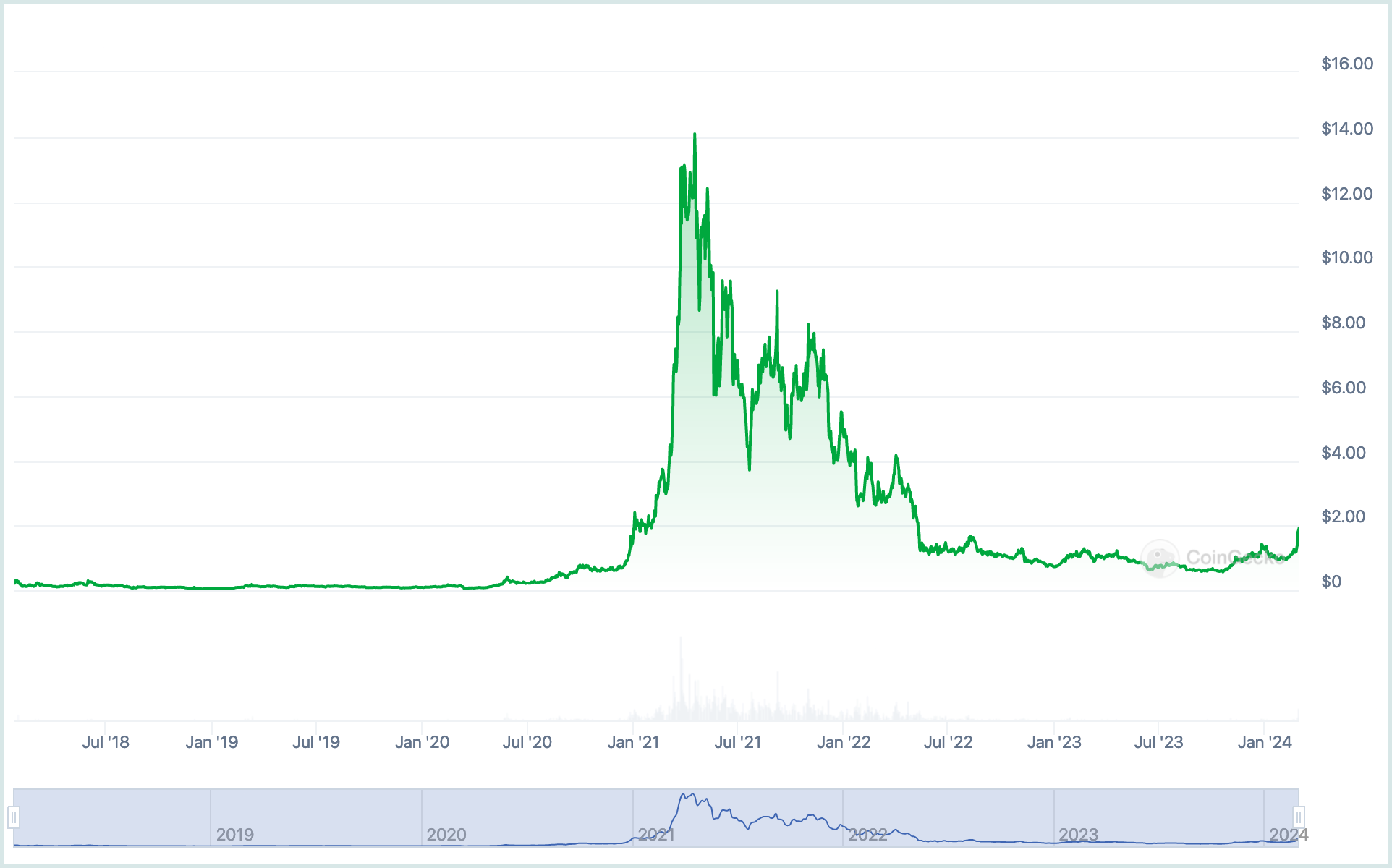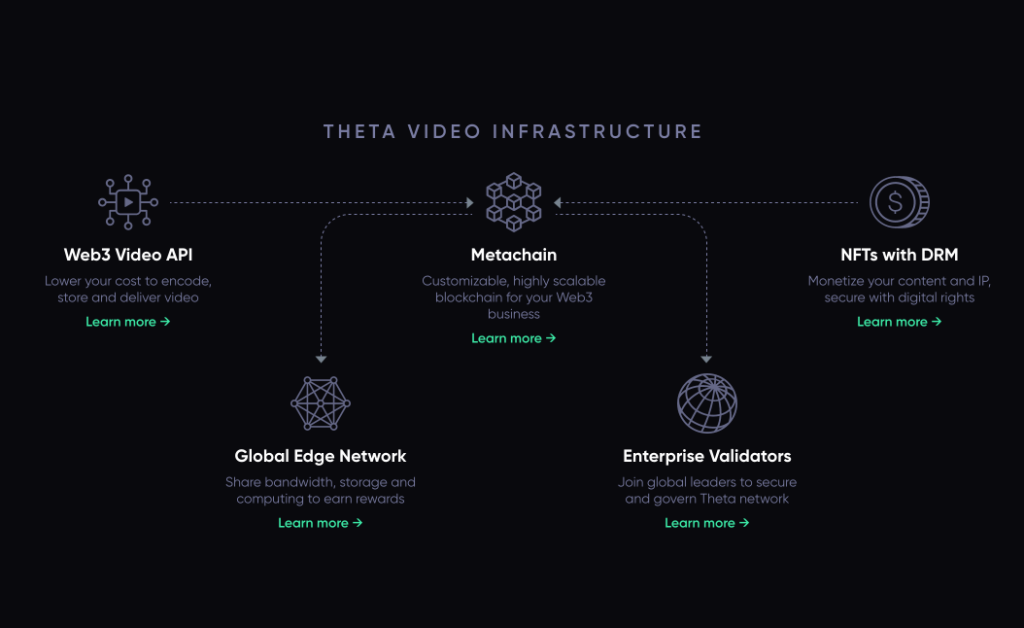It might be worth watching Theta in the coming year.
Theta Network is a decentralized video streaming platform backed by the very same people who founded YouTube and Twitch.
Right now, on-line videos are cached in massive, centralized data centers.
So when everyone is trying to watch cat videos or stream YouTube, Odyssey or Twitch — they start buffering. This is only going to get worse as more and more videos and live streams are using higher-quality, data-intensive formats like 4K.
How am I expected to work if the cat videos I have autoplaying on my 2nd monitor aren’t loading?
— We’ve all said this.
Introducing Theta
Theta is an open source blockchain solution that offers to alleviate the pressure on these data centers by opting to cache videos on a decentralized network of nodes.
Think of it more like a torrent service where multiple computers on the network cache the content, allowing for faster speed.
Theta uses the free bandwidth that’s sitting idle on the network as well as individuals’ computer resources to cache streams, which allows people who participate to earn rewards.
While Theta doesn’t intend to replace YouTube or other popular video platforms, it significantly reduces the cost for large businesses that can offset their reliance on expensive data centers while making their service more efficient. Additionally, since the videos are cached on a decentralized blockchain, user data is more secure.
Many people are bullish about Theta because of their founding team as well as the list of large companies that are already working as validators on the network. Theta has already been adopted by several large companies because they offset the reliance on large data centers for streaming.
Theta’s Team and Leadership
Theta’s team is a veritable who’s who of online video streaming, combining more than 30 years of experience in the industry.
It’s advisory team includes Steve Chen who serves as an advisor — known for founding a little-known company called Youtube — as well as Justin Kan, a co-founder of Twitch.
Mitch Liu currently serves as the CEO of the company, which has attracted multiple big-name investments, among them are technology industry giants like Samsung and Sony’s Innovation Fund.
By collaborating instead of attempting to out compete larger companies, Theta Labs hopes to build a product that can co-exist with platforms like YouTube.
Theta is set to disrupt today’s online video the way that YouTube did in 2005.
– Steve Chen, Co-founder of YouTube
Theta’s Vision
Theta’s advisor (and co-founder of YouTube) Steve Chen laid out the problem and how Theta’s development can solve it moving forward.
Theta’s innovation is set to disrupt today’s online video industry much in the same way that the YouTube platform did to traditional video back in 2005.
– Steve Chen, Co-Founder of YouTube –$theta $tfuelRemember.Good Things Take Time. pic.twitter.com/i0M0W0doBd
— Crypto Blend (@crypto_blend) May 2, 2022
Theta has come a long way.
Theta has almost a $2 billion market cap but along with the rest of the crypto market, it dropped significantly in the second half of 2022. Theta was sitting at over $5 billion in 2021 and had an all time high of over $15 USD in April of that year.
Theta has secured several Enterprise Validator nodes with companies like Google, Sony, Samsung, and Binance participating in processing transactions, validating data, and writing transactions to the blockchain. All of which must then be approved by a large network of decentralized nodes or users.
A few things that have happened
Also,
@SecrtPineapple or the “Secret Pineapple Society” dropping NFTs like these:
Theta #NFTs and, in particular, @SecrtPineapple has been a relative joy over the last few months as my crypto portfolio targets zero
It's been fun doing @GlitchLiu and @PineNewsNetwork as time allows
Thanks very much for the awesome gift @TheRareRobot 🍍🏅#alteredpines pic.twitter.com/sCbTQYuh2X
— Θ.URP (@Theta_URP) May 24, 2022
How Does the Platform Work?
Theta uses a Proof-of-Stake validation method.
It requires validators to stake their own Theta. This means if the node begins participating in fraudulent activity (deviates from the consensus of other nodes on the blockchain), the validator loses its stake.
This makes fraud expensive and impractical, better securing the Theta blockchain.
The minimum amount needed to stake is 1000 Theta.
A Decentralized Network of Nodes
There are three layers of nodes involved in making Theta run smoothly.
1st
Enterprise Validator nodes allow large companies to stake their Theta and to propose blocks of transactions to be added to the blockchain. There are currently 16 of these enterprise validators with the potential of more large companies coming on board.
The list of Enterprise Validators includes:
- Sony
- Samsung
- Binance
2nd
Next, are the Guardian Nodes. These are run by individual users.
Again, Theta is staked to validate proposed transactions and ensure they’re legitimate. There are more than 3,500 Guardian Nodes around the world, with a few on every continent except Antarctica.
As a side note, if you’re a penguin interested in getting into blockchain, we’d love to speak with you.
3rd
Finally, there are more than 100,000 Edge Nodes. These nodes utilize unused bandwidth and computer resources to cache videos. This is far less energy-intensive than building data centers. These require an enormous amount of energy to run and maintain (and keep cool). They also require rare metals that must be mined.
Peer-to-Peer Streaming
On the official Theta website, you can sign up to act as a node or a validator, essentially joining the network.
Theta also allows you to stream on Theta.tv video platform, Samsung VR, or other videos hosted by enterprise partners. Admittedly the list of decentralized video streamers isn’t very long yet but it’s growing.
Joining the network lets you earn extra rewards for sharing their free bandwidth and resources, actually benefiting from supporting Theta. Video platforms today (like YouTube) are happily selling your data to third-party companies and making money off advertising.
Since all of these videos are cached on multiple nodes, it is far more efficient to stream from anywhere around the world.
For new video platforms, it means they don’t need to invest in building expensive and energy-guzzling data centers.
ERC-20 No More
Theta was originally launched as an ERC-20 token. Theta used Ethereum’s (ETH) existing blockchain initially. However, after 2019, Theta had developed its own mainnet blockchain network and transitioned the tokens onto it. This meant that you can no longer store these ERC-20 Theta tokens in Ethereum-based wallets like MetaMask.
Instead, you can need to use Theta’s the native wallet. Or you can store them in wallets like Exodus along with many other cryptos. But if you want to stake and earn, you need the native wallet.
Note – DApps on the Ethereum network can’t work on Theta. You’ll have to use apps like Theta Edge.
Staking, Rewards and Earning TFuel
Participating on the Theta network is pretty straightforward. All the software you need is available from Theta’s website. Rewards are calculated daily and paid out in “Theta Fuel” (aka TFuel).
As a Guardian node, you’d help ensure that only valid transactions are passed onto the blockchain. To stake as a Guardian, you need to put down at least 1000 Theta and pay a transaction fee of up to 1 TFuel. However, you can also join a staking pool, where multiple users put in small amounts of Theta to help host a single node. For validators, the current annual percentage yield is around 1.9%. If you stake 1000 Theta, at a price of $6.30 per Tfuel token, that interest will turn into 384.26, which at a price of $0.40 makes you close to $120.
Theta’s All Time High reached $15.72 in April 2021.
via CoinGecko
TFuel’s All Time High was $0.68.
As with all cryptocurrencies, the price over time is volatile but trending upwards. It looks like the current circulating supply is exactly 1 billion. No wonder it has a market cap of over 5 billion.
If you are looking to purchase, Theta has a robust trading volume each day – around 250 million worth of exchanges per day.
As an Edge node, your bandwidth and computer’s resources are used to help keep the decentralized network running, and videos streaming smoothly. To become an edge node, you must agree to cache user videos on the Theta computer app. You can stake a minimum of 10,000 and a maximum of 100,000 TFuel into one edge node, earning TFuel rewards for caching videos. Running edge nodes currently earns up to 2 to 4% annually.
Something to look forward to /
Introducing the next evolution of Theta blockchain – Theta Metachain goes live in Q4 2022. Learn how Theta Metachain is designed to scale to the needs of Web3 businesses in the new whitepaper: https://t.co/5FnRkKgvIp pic.twitter.com/k8L8vpheXX
— Theta Network (@Theta_Network) April 8, 2022
Conclusion
With enterprise validators including Google and Samsung, as well as the co-founders of Youtube and Twitch as advisors, it is no surprise that we are still bullish on Theta in the long term.
Rather than attempting to overtake existing video streaming platforms, Theta works with larger companies to improve the user-streaming experience.
By using thousands of nodes to cache videos instead of data centers, companies save on costs and energy. By having many caches of videos across thousands of nodes, it becomes easier for users to stream cat videos uninterrupted.
There is strong early support as 16 companies have already joined on as Enterprise Validator nodes.
Proof-of-stake mining allows Theta to verify and validate data, add it onto the blockchain and earn rewards in TFuel.
Edge nodes can be run by anyone on a typical desktop or laptop and it allows them to stake their TFuel and earn rewards (more TFuel). Staking and running an Edge nodes allows the Theta network to access to excess bandwidth and resources on your computer to cache video streams.
Theta is worth keeping an eye on.
If you can imagine a world with more people streaming video and an increasing demand for video content it’s easy to see how Theta’s decentralized content delivery system could be in high demand.
Theta also looks like a good way to be part of the NFT ecosystem without trying to buy the next Punk, Ape, Vampire, Kittie or Whathaveyou.
Opinions and information only. Always do your own research (DYOR).
Related and More on Theta
Rob and Dave discussing the future of Theta…. could it power the Metaverse?




